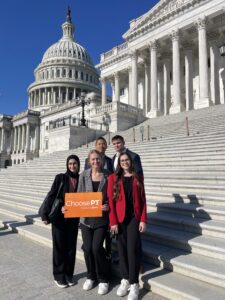HSC students highlight importance of physical therapy in D.C.
- May 2, 2024
- By: Eric Griffey
- Our People
Related Links
 Prior to coming to The University of North Texas Health Science Center at Fort Worth, Do Kyung Yun advocated alongside community members in his Los Angeles neighborhood. As a community organizer, Yun, a second-year physical therapy student who is known to friends as “DK,” used to frequent meetings at local and state legislative offices.
Prior to coming to The University of North Texas Health Science Center at Fort Worth, Do Kyung Yun advocated alongside community members in his Los Angeles neighborhood. As a community organizer, Yun, a second-year physical therapy student who is known to friends as “DK,” used to frequent meetings at local and state legislative offices.
In April, Yun put those skills to use to advocate on behalf of a law that would strengthen Medicare’s preventative measures and preserve telehealth for physical therapists. Yun and four other HSC PT students visited lawmakers in Washington, D.C., to talk about the benefits of H.R.7618, the Stopping Addiction and Falls for the Elderly Act. The quintet was in the nation’s capital representing the American Physical Therapy Association, a trade organization with a mission of advancing the profession.
The SAFE Act will permit occupational and physical therapists to administer fall risk assessments for seniors as part of their Medicare Annual Wellness benefit. The bill also will require Health and Human Services to submit a report to Congress on the number of falls experienced by seniors and the number of seniors who received treatment for pain or injury related to a fall each year. The bipartisan bill was introduced by Reps. Carol Miller and Melanie Stansbury.
“For me, the experience was very incredible,” Yun said of the trip. “It was inspiring to be surrounded by so many PTs and also students in leadership who are driven and passionate about making changes. We’re the ones on the ground doing the work, taking care of our patients, so if we’re not standing up for them, who else?”
First-year students Peyton Fisher, Teeba Gharbieh and Jonathan Hansen, and second-year student Kayla Castles applied to join Yun by writing an essay on why they would be good advocates for the profession.
“I stated in my essay how I’ve seen in clinic how the government and insurance companies combined can put a hold on patient care and can constrain what we can do as physical therapists,” Fisher said. “So being able to talk to people about what they can do to help us help people, I thought was a great opportunity — especially coming from a student perspective.”
While in D.C., the HSC contingent teamed up with PT students from other schools and met with staff from the offices of Texas Reps. Kay Granger, Roger Williams and Dr. Michael Burgess, Texas Sen. Ted Cruz and others.
“My trip to D.C. to advocate for the PT profession was enlightening,” Gharbieh said. “I learned so much about the struggles of our profession and how to advocate and push for bills to combat the issues we face. I hope to continue to advocate and put forth efforts to create positive changes in the future.”
The students discussed with elected officials adding fall risk assessments to Medicare. PTs are rigorously trained in working with older adults to assess a person’s movement and balance, as well as judging the safety of a person’s home.
The number of older Americans who fall and suffer serious, even fatal, injuries is soaring. About 36 million falls are reported among older adults each year — resulting in more than 32,000 deaths, according to Centers for Disease Control and Prevention data. Each year, about 3 million older adults are treated in emergency departments for a fall injury, almost a third higher than the number 10 years earlier.
The students also are hoping to convince elected officials to make permanent the Medicare telehealth flexibilities implemented during the COVID-19 pandemic. PTs can do in-home fall risk assessments over telehealth, which is especially crucial for patients in rural areas, regions that have few or no PTs, and for patients who can’t leave their homes.
“I am proud of our students who decided it was important for them to be able to represent their professional organization in advocating for improvement in the health of their future patients,” said Dr. Michael Furtado, chair of HSC’s Department of Physical Therapy. “The landscape of physical therapy will likely look different for them when they graduate, and it is more important than ever that all generations join in on advocating.”






Social media